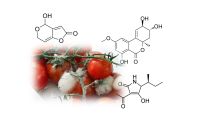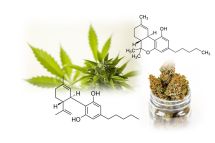Bioactive secondary metabolites of plants and microorganisms
Natural toxic compounds, mycotoxins, alkaloids

Some plants or microorganisms have the ability to synthesize complex organic compounds, products of specific secondary metabolism, generally used to protect producers from the harmful effects of the environment (predators or parasites). However, these substances are also usually toxic to humans, and can pose a significant health risk to consumers. Our working group deals mainly with mycotoxins, toxic secondary metabolites of filamentous micromycetes, and natural alkaloids, toxic products of some of the higher plants and some microscopic fungi. We work not only on the development of sensitive analytical methods based on chromatography and mass spectrometry, which are able to detect dozens of substances within a single analysis, but we also participate in the evaluation and interpretation of risks arising from the presence of these substances in food and natural products.
Publications
- Dzuman Z., Jonatova P., Stranska-Zachariasova M., Prusova N., Brabenec O., Novakova A., Fenclova M., Hajslova J.: Development of a new LC‒MS method for accurate and sensitive determination of 33 pyrrolizidine and 21 tropane alkaloids in plant-based food matrices. Analytical and Bioanalytical Chemistry (2020). Accepted. (doi: 10.1007/s00216-020-02848-6)
- Fenclova M., Novakova A., Viktorova J., Jonatova P., Dzuman Z., Ruml T., Kren V., Hajslova J., Vitek L., Stranska-Zachariasova M.: Poor chemical and microbiological quality of the commercial milk thistle-based dietary supplements may account for their reported unsatisfactory and non-reproducible clinical outcomes. Scientific Reports (2019) 9: 11118. (doi:10.1038/s41598-019-47250-0)
- Righetti L., Fenclova M., Dellafiora L., Hajslova J., Stranska-Zachariasova M., Dall'Asta Ch.: High resolution-ion mobility mass spectrometry as an additional powerful tool for structural characterization of mycotoxin metabolites. Food Chemistry (2018) 245: 768-774. (doi: 10.1016/j.foodchem.2017.11.113)
Projects
- 8E18B045: New mask masked ’Fusarium mycotoxins found in malt and beer, clarification of their origin and proposal of strategies for their minimization (Ministry of Education, Youth and Sports)
Principal Investigator at UCT Prague: doc. Ing. Milena Stránská, Ph.D.
- 20-14649S: Pulsed electric field as an innovative tool to reduce the occurrence of micromycetes of the genus Fusarium and mycotoxins in the barley-malt-beer chain (Czech Science Foundation)
Principal Investigator at UCT Prague: doc. Ing. Milena Stránská, Ph.D.
- 16-06008S: A novel comprehensive strategy for assessment of biological effects elicited by mixtures of chemicals occurring foods and food supplements (Czech Science Foundation)
Principal Investigator at UCT Prague: doc. Ing. Milena Stránská, Ph.D.
Cannabinoids

Plant cannabinoids (phytocannabinoids) are a group of structurally diverse bioactive secondary metabolites occurring in Cannabis sativa L. plants. C. sativa and cannabinoids are now increasingly popular in connection with the production and distribution of "healthy foods" and cannabis-based dietary supplements. Besides the most well-known psychotropic tetrahydrocannabinol (THC), being produced by certain C. sativa varieties (in particular C. sativa L. var. indica), tens up to hundreds of other phytocannabinoids with numerous positive biological effects (antioxidant, anti-inflammatory, immunomodulatory, etc.) are the subject of our current interdisciplinary research. In addition to development of analytical methods for efficient separation and sensitive detection of cannabinoids in various cannabis varieties and derived products, our working group collaborates also on determination of biological availability and biological endpoints of these compounds.
It should be noted that in addition to natural phytocannabinoids, the subject of our interest are also so-called synthetic cannabinoids, substances of completely different structure, but similar pharmacological effect such as THC. Their occurrence in food has recently been observed in the Czech Republic.
Publications
- Benes F., Fenclova M., Peukertova P., Binova Z., Dzuman Z., Hajslova J.: Determination of seventeen phytocannabinoids in various matrices by UHPLC-HRMS/MS. LCGC Europe (2020) 33(1): 8-16. Fulltext
- Vaclavik L., Benes F., Fenclova M, Hricko J., Krmela A., Svobodova V., Hajslova J., Mastovska K.: Quantitation of Cannabinoids in Cannabis Dried Plant Materials, Concentrates, and Oils Using Liquid Chromatography-Diode Array Detection Technique with Optional Mass Spectrometric Detection: Single-Laboratory Validation Study, First Action 2018.11. Journal of AOAC International (2019) 102(6): 1822-1833. (doi: 10.5740/jaoacint.18-0426)
Projects
- TJ02000238: Development of innovative analytical strategies usable for checking the safety and authenticity of food and food raw materials (Technology Agency of the Czech Republic)
Principal Investigator at UCT Prague: doc. Ing. Milena Stránská, Ph.D.
- FV40103: Biotechnology of cannabis cultivation for the production of CBD (Ministry of Industry and Trade)
Principal Investigator at UCT Prague: prof. Ing. Jana Hajšlová, CSc.
- TN01000048/04: Biorefining as a circulating technology - valorization of plant biomass by biorefining processes (Technology Agency of the Czech Republic)
Principal Investigator at UCT Prague: prof. Ing. Jana Hajšlová, CSc.
